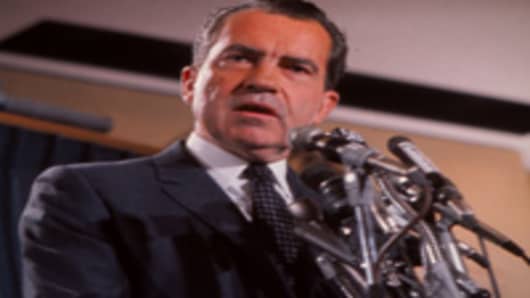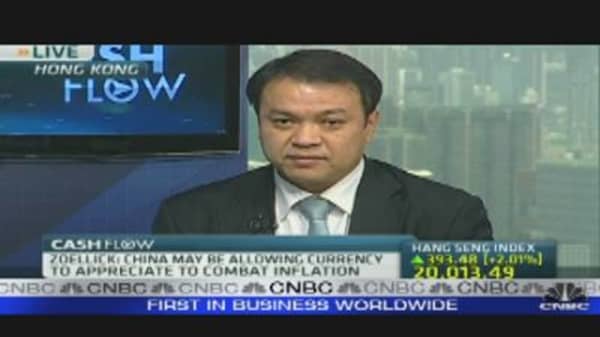When President Nixon went on his historic visit to China in 1972, he probably wouldn't have predicted that within four decades the country then struggling to emerge from decades of disastrous economic policies would be issuing tart statements urging the U.S. to adopt a more responsible fiscal policy, as its biggest creditor.
Or, indeed, that it would have become second only to the U.S. in the sheer size of its economy, with some predicting that it could take over as the world's largest economy within a decade, as its gross domestic product (GDP) growth—close to 10 percent per year—continues to close the gap.
Yet China has been adopting the role of sensible, savings-savvy maiden aunt to the naughty, debt-ridden U.S. And well she might—after all, China is now Uncle Sam's biggest foreign creditor, with around $1.2 trillion of U.S. debt.
"China, the largest creditor of the world's sole superpower, has every right now to demand the United States address its structural debt problems and ensure the safety of China's dollar assets," a statement from the official news agency Xinhua said in the wake of Standard & Poor's downgrade of the U.S.'s credit rating.
The statement also condemned the U.S.'s "debt addiction" and "short sighted" political wrangling.
"If the shift in power does happen, the financial crisis has been a demarcation event," Todd Lee, director of global economics at IHS Global Insight, told CNBC.com.
China's U.S. Treasury holdings are the cornerstone for a lot of conspiracy theories about the changing relationship between the two powers.
Apocalyptic Scenario
The apocalyptic scenario goes a little like this: China's increasing economic might and military power spooks the Western world. Eventually a crisis—such as the Western powers attempting to block China's access to oil from the Middle East—will provoke all-out war.
The continuing power of the Communist Party also raises concerns in the U.S.
"The worry is that China is going to take over and the West will collapse," Tim Stanley, a research fellow in American history at Royal Holloway College, told CNBC.com. "In the last 20 years, there has been a lot of talk along the lines of 'China doesn't play fair in world trade.' That has evolved into 'China owns the U.S.' "
But does China really want to own a low-growth economy with a diminishing supply of natural resources? Or is it just trying to stabilize its own economic growth?
"China's own actions suggest that taking over from the U.S. is not likely to happen for some time," said Tobin. "Even after the financial crisis, China didn't respond as you would expect somebody on the verge of becoming a superpower. It didn't go buying up distressed U.S. banks or funds."
The U.S. is by far China's biggest trade partner, with an estimated $385.3 billion worth of trade done between the two countries in 2010, according to the Chinese customs authorities.
When Chinese imports to the U.S. shrank in 2009, after the financial crisis of 2008, Chinese economic growth slowed to 8.7 percent, despite an aggressive stimulus package.
"While people talk about how powerful China is and how it owns a lot of U.S. government bonds, I think China actually has to invest in the U.S. bond market," Qinwei Wang, China economist at Capital Economics, told CNBC.com "China has chosen to play the foreign exchange market to keep its currency relatively stable."
"Because Europe and the U.S. are major markets, China has to invest a lot in foreign exchange there and the U.S. bond market," he added. "There are simply no better options for China at the moment. It's better for China to look to stabilize the market to avoid fluctuations."
Buying the U.S. dollar and U.S. Treasurys has helped China keep the renminbi from strengthening too aggressively against the dollar, thereby raising the price of its exports.
"The tipping point would be if we could have greater use of the renminbi as a reserve currency," Damian Tobin, Lecturer in Chinese Business and Management at the School of Oriental and African Studies in London, told CNBC.com. "If you got to the stage where Chinese companies could invoice in renminbi instead of U.S. dollars, that would make it easier, but it's very difficult to get to that stage."
"All these powers rely on buying each others' goods," said Stanley. "The U.S. needs free trade with China because it will become a new marketplace for U.S. goods."
China is usurping the U.S. as the biggest consumer of many commodities, as construction and infrastructure investment booms. As it has become less isolated from the world, it has correspondingly become more reliant on other countries.
China's Own Problems
"China has its own problems, including concerns over U.S. debt," said Lee. "Europe's not in great shape. Even if the U.S. does get downgraded, in terms of large investments U.S. Treasurys are still the safest."
China's own economy is far from trouble-free, despite its impressive growth rate, and it has its own debt problems.
"While the debt-to-GDP ratio is fairly low, that just addresses the national government, not local government debt," said Lee. "During the crisis of '08-'09, China just unleashed this massive stimulus on the economy and one of the consequences is this local debt problem."
"They already have the after-effects from the last stimulus, and if there's another downturn, they would find it difficult to enact the same measures again," he added.
It is difficult to find exact statistics for local government debt in China, much of which was incurred by its local government financing platform during the recent stimulus package.
"A lot of it wasn't really needed and went to projects which weren't economically viable," said Tobin. "There's potential for an awful lot of trouble."
There are also concerns about burgeoning inflation. Consumer prices rose 6.5 percent in July, compared with the same month last year, even though the central bank has raised interest rates five times since October.
There are still many sticking point for foreign companies trying to operate in China, notably intellectual property, which is less stringently enforced there.
"There's this big question of what's the Chinese approach to economic growth, and what's its development model?" said Tobin.
"I really don't think it has been decided yet. The Chinese seem to try a lot of things. It's economic pragmatism rather than concentrated set of principles."
The Chinese government cannot completely control what social effects will follow the economic boom.
China has already taken on some characteristics more usually associated with the West as its economy matures, such as a growing demand for consumer goods and a rising level of childhood obesity.
Beijing Consensus
The Beijing consensus, a concept which was created by Western economists, concludes, among other things, that rapid economic growth in China won't lead to increased demands for democracy and freedom of expression, as long as the powers that be continue to deliver high levels of growth.
The image of the Chinese populace as innately more subservient than the rowdier, more demanding citizens of the West may prove to be untrue.
While the Chinese population are not in large-scale revolt at the moment, experts believe the Communist Party's position may not always be as unshakeable as it once seemed, particularly if GDP growth falls below 8 percent a year, the level deemed necessary to driving investment growth and employment.
Recent protests over a the death of at least 40 people on a much-vaunted high-speed rail line, and strikes by taxi drivers in the eastern city of Hangzhou, indicate that not everyone will stay deferential to their leaders.
If Chinese citizens, who have high savings rates partly because of the costs of education and health, start demanding more from their state, its growth could slow.
"If you have welfare reforms and currency reforms within China, you are unlikely to see China replacing the U.S. as an economic superpower," said Tobin.
"The Chinese are going to start demanding the same sort of benefits the U.S. has," said Stanley. "In China, protests are always demanding that the government does more, not that it does less."
So the U.S. could possibly retain its position as the world's biggest economy a while longer, but only if the Chinese population become more like Westerners. McDonalds and Apple may have a patriotic duty to keep on opening across the land.





